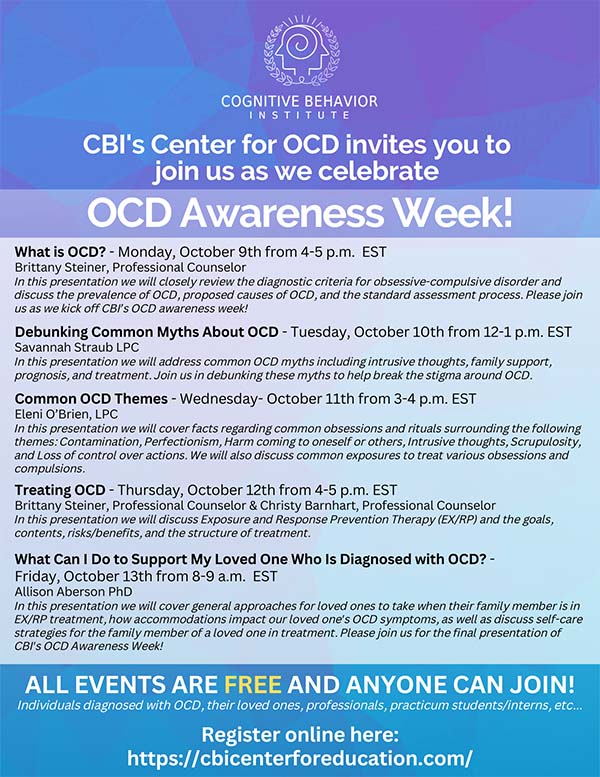Obsessive-Compulsive Disorder, commonly known as OCD, is a mental health condition affecting millions worldwide. Over the past year, an estimated 1.2% of adults in the US struggled with symptoms of OCD. To break it down further, 1 out of every 100 adults and 1 out of every 200 kids/teens will have OCD. While OCD is fairly common, it takes about 14-17 years for someone with OCD to receive effective treatment! The exact causes of OCD are not fully understood, but research suggests a combination of genetic, neurological, and environmental factors may contribute to its development. The typical age of onset is 10-12 and late teens/early adulthood, but it can impact children as young as 5.
In honor of OCD Awareness Week 2023, we want to shed some light on Obsessive-Compulsive Disorder, share resources, and give an overview of treatment options. By understanding OCD better, we can break down the stigma surrounding it and offer support to those who need it.
What is Obsessive-Compulsive Disorder?
Obsessive-Compulsive Disorder is a mental health condition characterized by two main components: obsessions and compulsions.
Obsessions: These are defined as intrusive recurrent thoughts, images, or impulses that are unwanted, repetitive, and cause distress. These are often described as “brain farts” or things that just pop into your head.
Compulsions: Compulsions are repetitive behaviors or mental acts that individuals with OCD feel compelled to perform in response to their obsessions. These actions aim to reduce the anxiety or discomfort caused by the obsessions. Compulsions can be physical acts, such as checking locks or excessive washing, as well as mental acts, such as repeating neutralizing thoughts, praying, or excessive self-reassurance.
OCD symptoms can vary widely from person to person, but common signs include:
- Excessive cleaning or washing
- Repeated checking of locks, appliances, or tasks
- Counting rituals or arranging items in a specific way
- Hoarding or difficulty discarding items
- Fear of contamination
- Intrusive thoughts of harm to oneself or others
- Need for symmetry or order
- Mental rituals, such as praying or silently repeating phrases
The Cycle of Obsessive-Compulsive Disorder
OCD often follows a vicious cycle:
- Obsession: A distressing thought or urge occurs, such as the fear of germs or the idea that something terrible will happen.
- Anxiety: The obsession triggers extreme anxiety and discomfort in the individual.
- Compulsion: To alleviate the anxiety, the person performs a compulsion, like washing their hands excessively or counting to a specific number.
- Temporary Relief: The compulsion temporarily relieves the anxiety, reinforcing the behavior.
- Repeat: The cycle repeats, with obsessions and compulsions becoming more frequent and intense over time.
Treatment Options for Obsessive-Compulsive Disorder
Fortunately, OCD is a treatable condition! Exposure and Response Prevention (ERP) is the gold standard for OCD. ERP involves gradual exposure to obsessions without performing compulsions. This therapy leads to new learning, weakens the habit of responding to obsessions with compulsions, decreases anxiety overall, disconfirms the feared consequences, increases tolerance of uncertainty, and helps individuals feel more in control of their OCD.
Medication, in conjunction with therapy, has been proven to help alleviate symptoms of OCD.
Conclusion/Next Steps
Obsessive-Compulsive Disorder is a complex mental health condition that affects many people worldwide. It’s essential to understand that OCD is not a choice or a quirk; it’s a genuine medical condition that requires empathy, support, and appropriate treatment. By raising awareness and breaking down the stigma surrounding OCD, we can create a more inclusive and compassionate society where individuals with OCD can thrive. If you or someone you know is struggling with OCD, please don’t hesitate to reach out. Dana Birnbaum, one of our therapists at Lake Forest Wellness, specializes in OCD and ERP and would be happy to answer any questions you might have. In addition, CBI is offering free webinars this week in honor of OCD Awareness Week. Remember, there is hope and help available.

